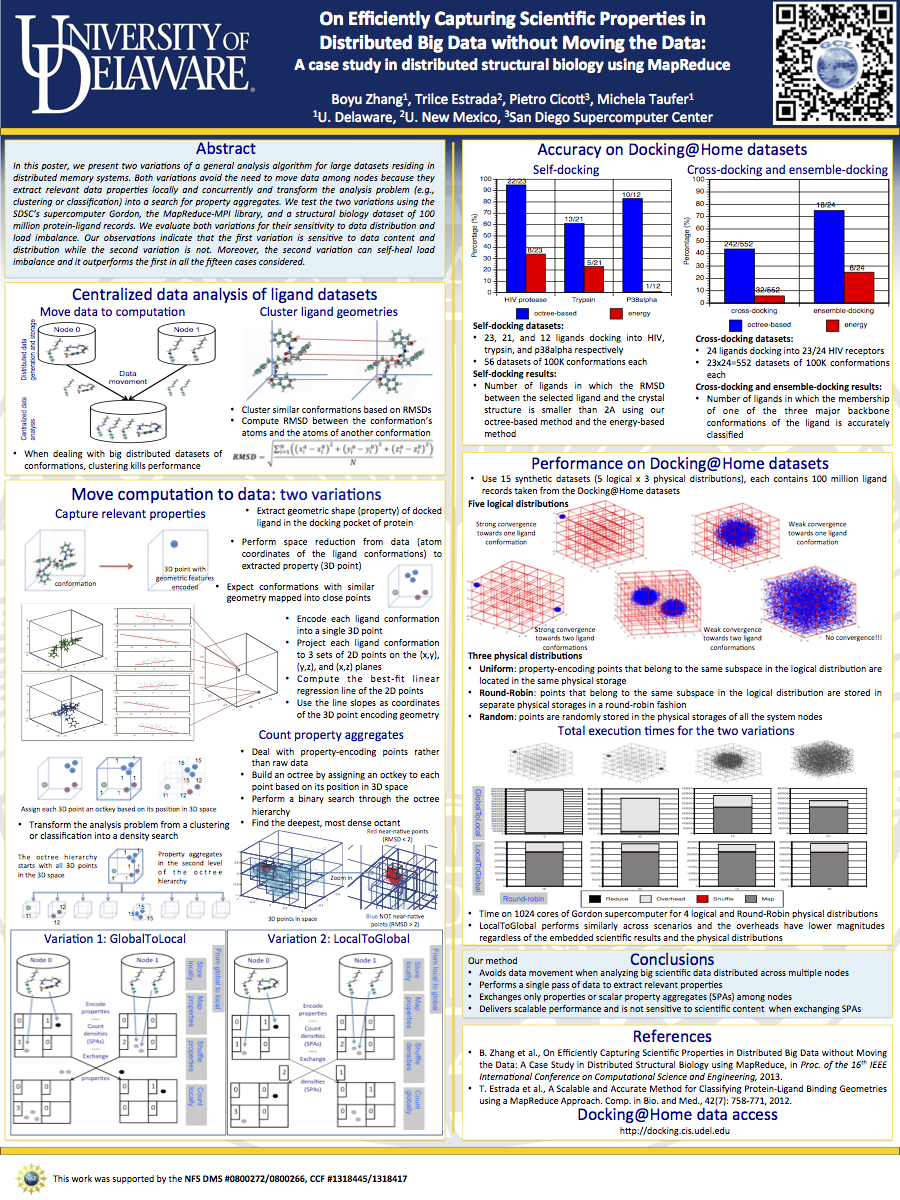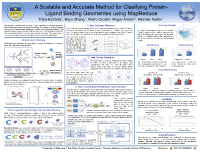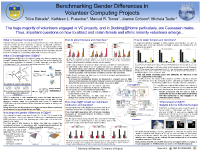Docking@Home Project Posters and Papers
Posters
Papers in conferences and journals
2013
- B. Zhang, T. Estrada, P. Cicotti, and M. Taufer. On Efficiently Capturing Scientific Properties in Distributed Big Data without Moving the Data - A Case Study in Distributed Structural Biology using MapReduce. In the Proceedings of the 16th IEEE International Conferences on Computational Science and Engineering, December 2013, Sydney, Australia. Slides
- T. Estrada, K. Pusecker, M. Torres, J. Cohoon, and M. Taufer. Benchmarking Gender Differences in Volunteer Computing Projects. In the Proceedings of the Third Workshop on Analyzing and Improving Collaborative eScience with Social Networks (eSoN). October 2013, Beijing, China. Slides
2012
- M. Matheny, S. Schlachter, L. Crouse, E. Kimmel, T. Estrada, M. Schumann, R. Armen, G. Zoppetti, and M. Taufer. ExSciTecH: Expanding Volunteer Computing to Explore Science, Technology, and Health. In Proceedings of the 2nd workshop on Analyzing and Improving Collaborative eScience with Social Networks (eSoN 12). October 2012, Chicago, Illinois, USA.
- T. Estrada, B. Zhang, P. Cicotti, R. Armen, and M. Taufer. A scalable and accurate method for classifying protein-ligand binding geometries using a MapReduce approach Computers in Biology and Medicine, 2012.
- T. Estrada, B. Zhang, P. Cicotti, R. Armen, M. Taufer. Reengineering high-throughput molecular datasets for scalable clustering using MapReduce. In Proceedings of the 14th IEEE International Conference on High Performance Computing and Communications (HPCC-2012). June 2012, Liverpool, UK.
2011
- O. Rahaman, T. Estrada, D. Doren, M. Taufer, C. L. Brooks III, R.S. Armen: Evaluation of Several Two-Step Scoring Functions Based on Linear Interaction Energy, Effective Ligand Size, and Empirical Pair Potentials for Prediction of Protein-Ligand Binding Geometry and Free Energy . Journal of Chemical Information and Modeling, 2011
- T. Estrada and M. Taufer: Providing Application-Level Quality of Science in Volunteer Computing. In Proceedings of the 13th IEEE International Conference on High Performance Computing and Communications (HPCC-2011). September 2011, Banff, Canada.
2010
- T. Estrada, R. Armen, and M. Taufer: Automatic Selection of Near-Native Protein-Ligand Conformations using a Hierarchical Clustering and Volunteer Computing . In Proceedings of the International Conference On Bioinformatics and Computational Biology (ACM-BCB), August 2010, Niagara Falls, NY, USA. li>
2009
- T. Estrada, M. Taufer, and D. Anderson: Performance Prediction and Analysis of BOINC Projects: An Empirical Study with EmBOINC. Journal of Grid Computing, Volume 7, Pages 537–554, 2009.
- M. Taufer, R.S. Armen, J. Chen, P.J. Teller, and C.L. Brooks III: Computational Multi-Scale Modeling in Protein-Ligand Docking. IEEE Engineering in Medicine and Biology Magazine. Volume 28, Issue 2, Pages 58 - 69, 2009.
- J. Atlas, T. Estrada, K. Decker, and M. Taufer: Balancing Scientist Needs and Volunteer Preferences in Volunteer Computing using Constraint Optimization. In Proceedings of the International Conference on Computational Science (ICCS), May 2009, Baton Rouge, Louisiana, USA.
- T. Estrada, K. Reed, D. Anderson, and M. Taufer: EmBOINC: An Emulator for Performance Analysis of BOINC Projects. In Proceedings of PCGrid 2009, May 2009, Rome, Italy
- T. Estrada, K. Reed, and M. Taufer: Modeling Job Lifespan Delays in Volunteer Computing Projects. In Proceedings of to the 9th IEEE International Symposium on Cluster Computing and Grid (CCGrid), May 2009, shanghai, China.
2008
- T. Estrada, O. Fuentes, and M. Taufer: A Distributed Evolutionary Method to Design Scheduling Policies for Volunteer Computing. In Proceedings of ACM Computing Frontiers 2008,May 2008, Ischia, Italy.
2007
- G. Lopez, M. Taufer, and P.J. Teller: Evaluation of IEEE 754 Floating-Point Arithmetic Compliance Across a Wide Range of Heterogeneous Computers. In Proceedings of the 2007 Richard Tapia Celebration of Diversity in Computing Conference, October 2007, Orlando, Florida, USA.
- M. Taufer, A. Kerstens, T. Estrada, D.A. Flores, and P.J. Teller: SimBA: a Discrete Event Simulator for Performance Prediction of Volunteer Computing Projects. In Proceedings of the International Workshop on Principles of Advanced and Distributed Simulation 2007 (PADS'07), June 2007, San Diego, California, USA.
- M. Taufer, A. Kerstens, T. Estrada, D.A. Flores, R. Zamudio, P.J. Teller, R. Armen, and C.L. Brooks III: Moving Volunteer Computing towards Knowledge-Constructed, Dynamically-Adaptive Modeling and Scheduling. To appear in Proceedings of the First Workshop on Large-Scale, Volatile Desktop Grids (PCGrid'07), in conjunction with IPDPS'07 March 2007, Long Beach, California, USA.
2006
- T. Estrada, D. Flores, M. Taufer, P. Teller, A. Kerstens, and D. Anderson: The Effectiveness of Threshold-based Scheduling Policies in BOINC Projects. In Proceedings of the 2st IEEE International Conference on e-Science and Grid Technologies (eScience 2006). December 2006, Amsterdam, The Netherlands.
2005
- M. Taufer, M. Crowley, D. Price, A.A. Chien, and C.L. Brooks III: Study of an Accurate and Fast Protein-Ligand Docking Algorithm based on Molecular Dynamics. Concurrency and Computation: Practice and Experience. Volume 17, Issue 14, Pages: 1627-1641, December 2005.
- M. Taufer, P.J. Teller, D.P. Anderson, and C.L. Brooks III: Metrics for Effective Resource Management in Global Computing Environments. In Proceedings of the 1st IEEE International Conference on e-Science and Grid Technologies (eScience 2005). December 2005, Melbourne, Australia.
- M. Taufer, D.P. Anderson, P. Cicotti, and C.L. Brooks III: Homogeneous Technique to Ensure Integrity of Molecular Simulation Results Using Public Resources. In Proceedings of the 14th Heterogeneous Computing Workshop (HCW 2005), with IPDPS 2005, April 2005, Denver, Colorado.
2004
- M. Taufer, M. Crowley, D. Price, A.A. Chien, and C.L. Brooks III: Study of an Fast Protein-Ligand Docking Algorithm based on Molecular Dynamics. In the Third IEEE International Workshop on High Performance Computational Biology 2004), in conjunction with IPDPS 2004, April 2004, Santa Fe, New Mexico.
Learn more about The Science
Learn more about Advanced Science Concepts
Go back to About the Docking@Home Project



